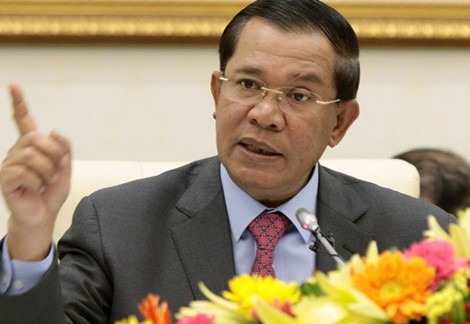(VOVworld) – Cambodia’s fifth parliamentary election will take place in three days. Although there will be 8 parties participating in the election, the race will come down to the Cambodian People’s Party, CPP, led by Prime Minister Hun Sen and the Cambodian National Rescue Party, CNRP, of Sam Rainsy. So far, the ruling CPP party seems to have the advantage, suggesting that Prime Minister Hun Sen will continue leading the nation.
 |
In power for 28 years, Hun Sen now has the longest current tenure as prime minister
in Southeast Asia (Photo: kienthuc.net.vn) |
According to Cambodia’s Election Commission, about 9.6 million voters out of 14 million people will cast votes to choose 123 legislators. A month ago, 8 political parties began campaigning, the biggest being CPP, CNRP, and FUNCIPEC, the United National Front for an Independent, Neutral, Peaceful, and Cooperative Cambodia.
The CPP has focused on helping the incumbent Prime Minister win another 5-year term. The CPP plans to continue allying with FUNCIPEC to form a new government if it wins the election. According to a CPP statement, Cambodia will continue to resolve border disputes with neighbors in accordance with Cambodia’s constitution, laws and international charter to protect Cambodia’s territorial integrity, and develop a border of peace, friendship, and cooperation. The CPP says it will do its best to get at the international justice court to uphold the 1962 judgment recognizing Cambodia’s sovereignty over Preah Vihear temple.
CNRP, the opposition party led by Sam Rainsy who is living in exile, says it will give each Cambodian over 65 years old 10 USD a month, increase the minimum monthly salary of workers to 150 USD - 250 USD for civil servants. It will reduce prices of petroleum, electricity, and fertilizers, and provide free medical services for the poor.
FUNCIPEC Party led by Princess Norodom Arun Rasmey, the youngest daughter of late King Norodom Sihanouk, promises to protect the monarchy, and Cambodia’s territorial integrity, and maintain peace, unity, and national reconciliation.
Observers say Hun Sen and his ruling party, who won the two previous elections, are likely to have another victory. Hun Sen has been in power for 28 years. It’s impossible to deny that under his leadership, Cambodia has turned from a war-torn country into one of the fastest growing economies in Southeast Asia. Its tourism industry is booming.
Last year Cambodia received 3.5 million visitors earning 2.2 billion USD - 12% of Cambodia’s GDP. Established in 1993 following an election moderated by the United Nations, the democratic nation is becoming a regional ‘small tiger’, maintaining an economic growth of 10% over a decade until the 2008 financial crisis.
With these achievements the Cambodian people will probably not risk swapping the current political stability for an unguaranteed future.
Before the election, Hun Sen asked the Royal Family to proclaim amnesty for Sam Rainsy, the opposition party’s leader, who was previously sentenced to 11 years of imprisonment and is living in exile. This smart move enhanced Hun Sein’s image as a democratic leader who supports a competitive multi-party system. And amnesty for Rainsy relieves some of the emotional pressure that has built up since Rainsy was convicted and left the country.